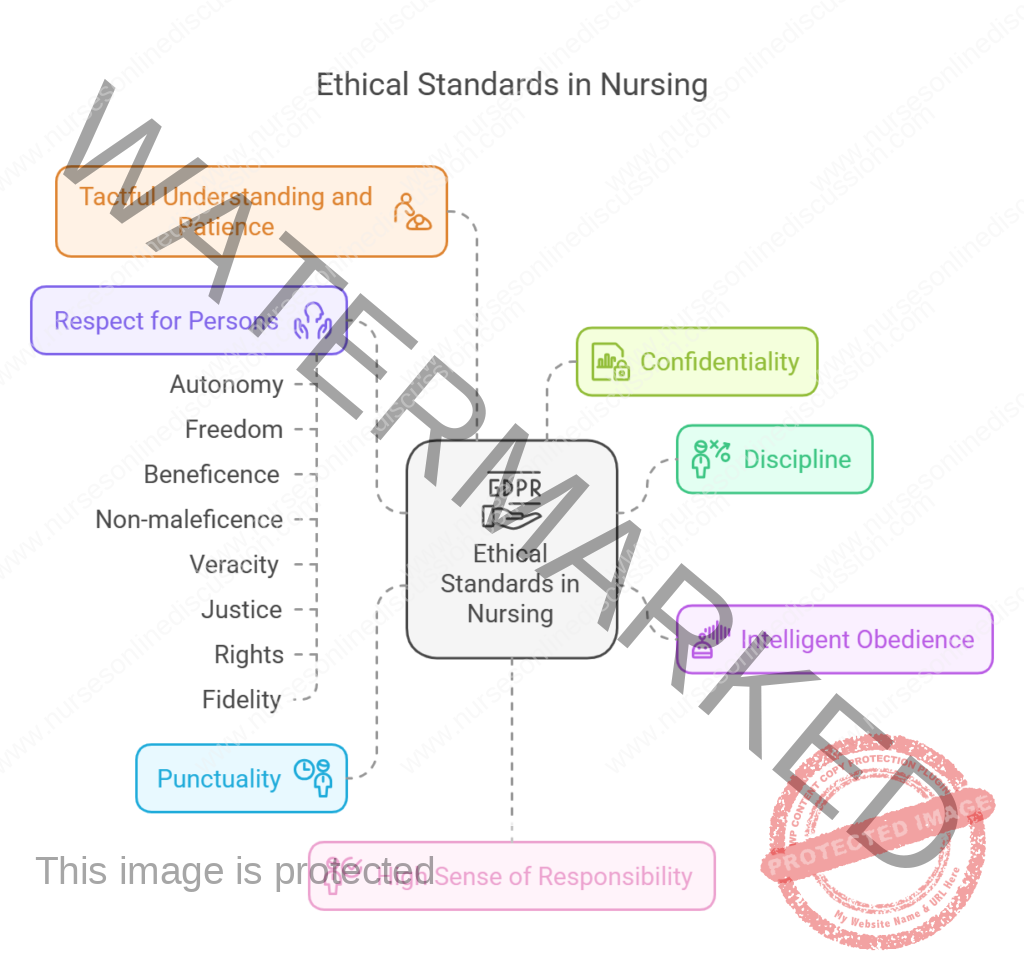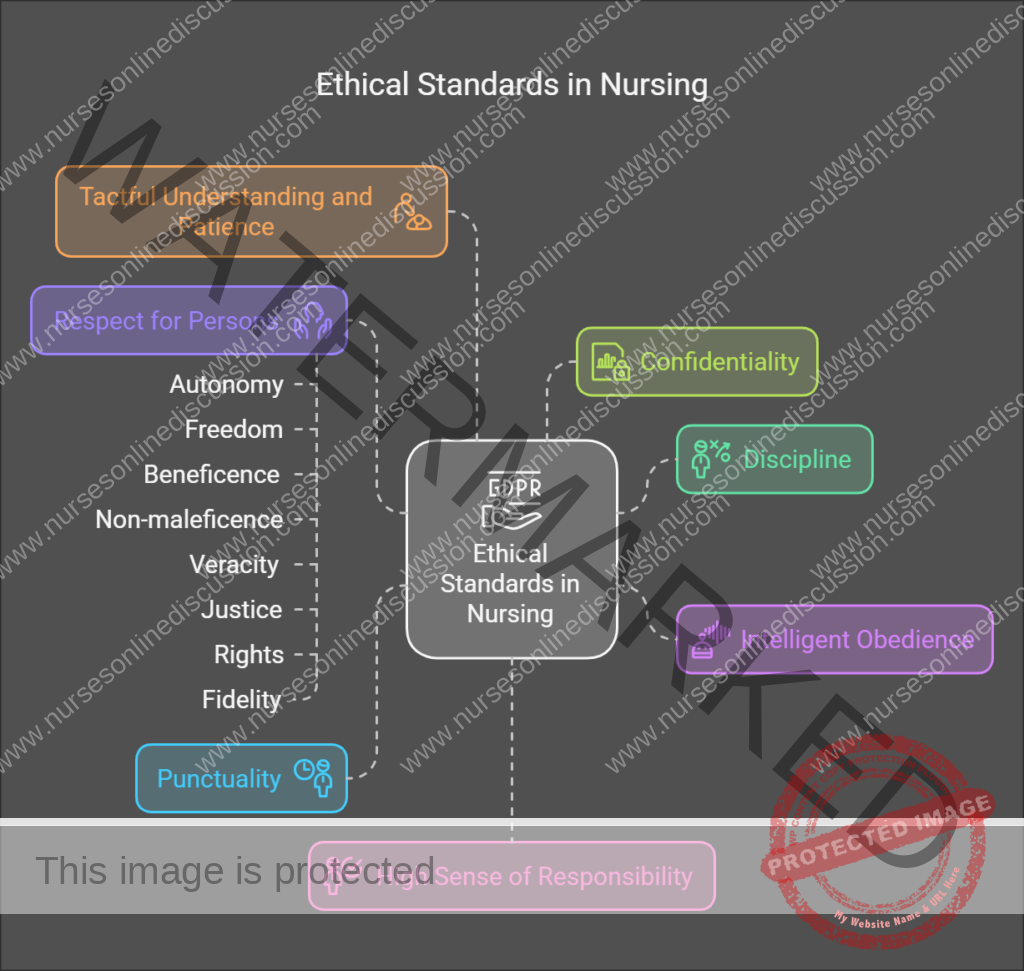Foundations of Nursing 1
Subtopic:
Principles of Professional Nursing Ethics and Etiquette

Learning Objectives
- Define the ethical standards guiding professional nursing behavior.
- Distinguish between moral rules and ethical principles in nursing practice.
- Apply ethical values like beneficence, autonomy, fidelity, and justice in care delivery.
- Demonstrate ethical conduct by following professional responsibilities and boundaries.
- Recognize unacceptable behaviors and the importance of ethical decision-making.
- Respond to objective questions to assess comprehension of nursing ethics and standards.
Rules about right and wrong, called ethical standards, are seen as more important than laws. For instance, the law says stealing is wrong and you can be punished for it. But even if there’s no law against it, things like lying are still wrong based on what we think is the right way to act.
Ethical Standards in Nursing
1. Discipline
2. Intelligent obedience
3. Punctuality
4. Tactful understanding and patience
5. Respect for persons
6. Respect for autonomy
7. Respect for freedom
8. Respect for beneficence
9. Respect for non-maleficence
10. Respect for veracity (truth-telling)
11. Respect for justice (fair and equal treatment)
12. Respect for rights
13. Respect for fidelity (fulfilling promises)
14. Confidentiality (protecting privileged information)
15. High sense of responsibility
These standards ensure that nurses maintain the highest level of professionalism and ethical behavior in their practice.
Moral Rules for Nurses
Here are some important rules about right and wrong for nurses:
- Being organized and in control
- Having a good mind and using it wisely
- Doing what you’re told to do
- Being on time
- Knowing how to say things in a kind way
- Trying to understand others
- Being able to wait calmly
Respecting Others
- Treating everyone with value
- Letting people make their own choices as much as they can
- Respecting people’s freedom
- Wanting to do good for people
- Making sure not to cause harm
- Telling the truth
- Treating everyone fairly and equally
- Honoring people’s rights
- Keeping your promises
- Keeping private information safe
- Taking your job very seriously
Being a Good Nurse: Ethics
Like other jobs, nursing has its own rules about what’s right and wrong that all nurses should follow. Here are some of them:
A nurse’s main job is to:
- Keep people alive
- Make suffering less (Think of this as the main goal)
- Help people stay healthy
- Nurses must always give the best care they can.
- Nurses need to keep learning and improving their skills.
- Nurses should respect what patients believe about religion.
- Nurses need to know what they are responsible for and what they can and cannot do.
- Nurses must keep personal information private.
- Nurses should follow doctors’ orders carefully and refuse to do things that are not ethical, like abortion or helping someone die.
- Nurses deserve to be paid fairly and should only accept the pay they agreed to.
- Nurses shouldn’t let their names be used to advertise products or try to get attention for themselves, like wearing their uniform when they don’t need to.
- Nurses should work well with other health workers.
- Nurses should help the community stay healthy, locally and worldwide.

Objective Questions on Ethical Standards in Nursing
Which of the following is NOT considered an ethical standard in nursing?
a) Discipline
b) Intelligent obedience
c) Punctuality
d) Personal gain
Answer: d) Personal gain
Rationale: Ethical standards in nursing focus on professionalism and patient care, not personal gain.
What does the ethical principle of "non-maleficence" mean?
a) To do good
b) To do no harm
c) To tell the truth
d) To respect autonomy
Answer: b) To do no harm
Rationale: Non-maleficence means avoiding actions that cause harm to patients.
Which ethical standard emphasizes the importance of protecting privileged information?
a) Fidelity
b) Confidentiality
c) Veracity
d) Justice
Answer: b) Confidentiality
Rationale: Confidentiality involves protecting patient information from unauthorized disclosure.
What is the primary responsibility of a nurse according to ethical standards?
a) To conserve life
b) To promote personal interests
c) To advertise professional skills
d) To accept bribes
Answer: a) To conserve life
Rationale: The fundamental responsibility of a nurse is to conserve life, alleviate suffering, and promote health.
Which of the following is an example of respecting a patient's autonomy?
a) Making decisions for the patient without their consent
b) Providing accurate information and obtaining informed consent
c) Disclosing patient information to unauthorized individuals
d) Ignoring the patient's wishes and preferences
Answer: b) Providing accurate information and obtaining informed consent
Rationale: Respecting autonomy means allowing patients to make informed decisions about their care.
What does the ethical principle of "beneficence" mean?
a) To do good
b) To do no harm
c) To tell the truth
d) To respect autonomy
Answer: a) To do good
Rationale: Beneficence involves actions that promote the well-being of patients.
Which ethical standard requires nurses to fulfill promises made to patients?
a) Fidelity
b) Confidentiality
c) Veracity
d) Justice
Answer: a) Fidelity
Rationale: Fidelity involves being faithful to commitments and promises made to patients.
What should a nurse do if they observe a colleague engaging in unethical behavior?
a) Ignore the behavior
b) Report the behavior to the appropriate authorities
c) Join in the unethical behavior
d) Keep it a secret
Answer: b) Report the behavior to the appropriate authorities
Rationale: Nurses have a duty to report unethical behavior to maintain professional standards.
Which ethical standard emphasizes fair and equal treatment of all patients?
a) Fidelity
b) Confidentiality
c) Veracity
d) Justice
Answer: d) Justice
Rationale: Justice involves treating all patients fairly and equally.
What is the ethical responsibility of a nurse when providing care to a patient in detention?
a) To prioritize the detainee's health and maintain confidentiality
b) To disclose the detainee's health information to authorities
c) To refuse to provide care to the detainee
d) To accept bribes from the detainee
Answer: a) To prioritize the detainee's health and maintain confidentiality
Rationale: Nurses must provide care to detainees with the same ethical standards as other patients, including maintaining confidentiality.
Join Our WhatsApp Groups!
Are you a nursing or midwifery student looking for a space to connect, ask questions, share notes, and learn from peers?
Join our WhatsApp discussion groups today!
Join NowRelated Topics
- History of Nursing
- The Role of the Nurse
- Code of Conduct for Nurses
- Principles of Professional Nursing Ethics and Etiquette
- Patient’s Rights
- Nursing and the Law
- Nursing Standards and Qualities of a Nurse
- General Principles and Rules of All Nursing Procedures
- Hospital Economy
- Use of Personal Protective Equipment
- Routine and Weekly Cleaning of the Ward
- Waste Management and Disposal
- Isolation of Infectious Patients
- Causes of Infection
- Medical Waste Disposal and Management
- Cleaning Methods
- Carry out Adequate Feeding of Patients
- Perform Bladder and Bowel Care
- Passing a Flatus Tube
- Administration of Enema
- Ward Report
- Lifting/Positioning a Patient
- Tepid Sponging
- General Principles in Patient Care
- Ethics in Nursing Care
- Principles of Infection Prevention and Control
- Body Mechanics
- Bed Making
- Vital Observations
- Bed Bath
- Oral Care/Mouth Care
- Care and Treatment of Pressure Ulcers
Get in Touch
(+256) 790 036 252
(+256) 748 324 644
Info@nursesonlinediscussion.com
Kampala ,Uganda
© 2025 Nurses online discussion. All Rights Reserved Design & Developed by Opensigma.co

